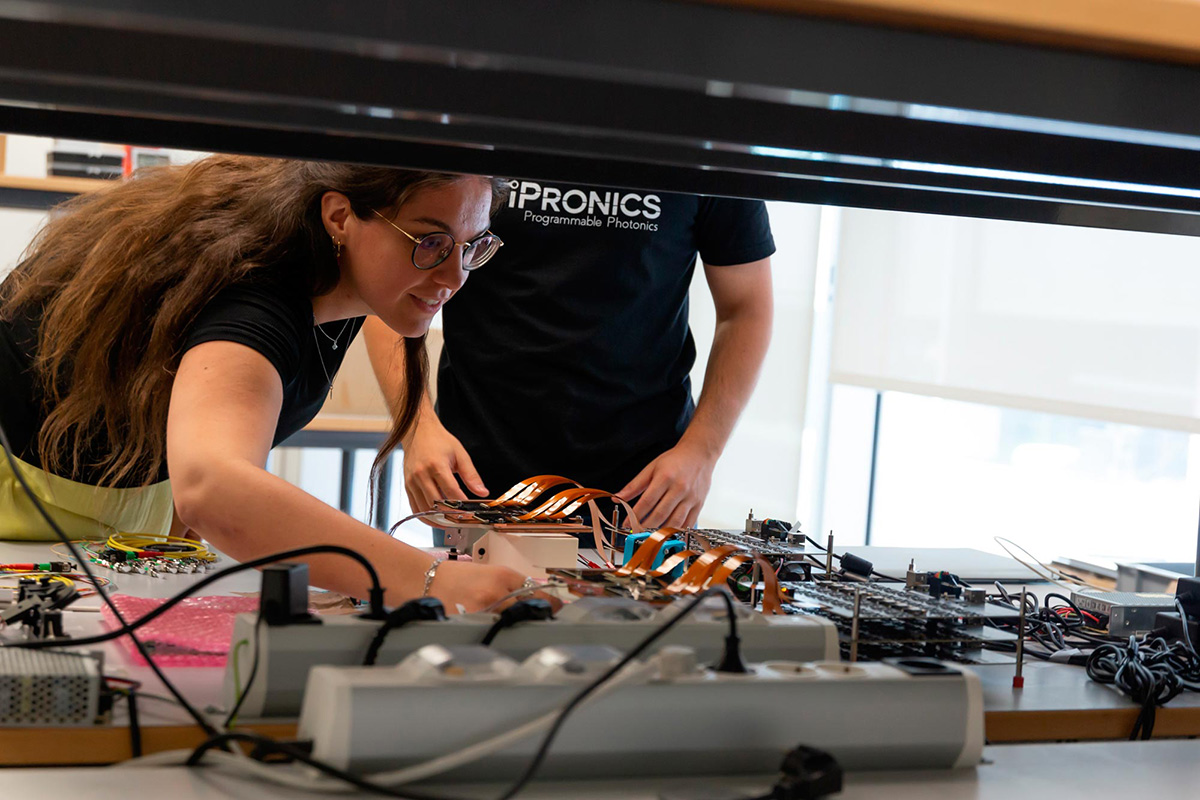Spain-based iPronics is (along with Salience Labs) one of two silicon photnics–focused startups with which the telecom giant Vodafone is partnering. [Image: iPronics]
The international telecommunications firm Vodafone has announced a significant expansion of its R&D campus in Málaga, Spain—and reported the facility upgrade with a pointed nod to silicon photonics. Specifically, Vodafone noted that it was partnering with two startups, Spain-based iPronics and UK-based Salience Labs, to explore “the potential for new silicon photonic chips to become the hardware of choice to drive the customer-focused mobile networks of the future.”
Making room for growth
A UK-based multinational company, Vodafone operates the largest 5G network in Europe and is a significant telecom and fintech force in Africa. The company’s Málaga R&D hub originally opened in 2022, and the facility there now includes “more than 430 highly skilled engineers made up of over 30 nationalities.” The firm plans to boost that number by another 170 persons by 2025.
To make room for that growth, Vodafone has opened a second location in Málaga, in a property owned by the University of Málaga. The company is styling the new location as an “innovation campus,” where Vodafone would work closely with the university and its research groups.
Silicon photonics vision
Even as it unveiled these facility and planned staff expansions in Málaga, Vodafone stressed the importance of silicon photonics to its R&D vision there and elsewhere. The company is attracted to the speed and efficiency of silicon photonic chips, which it says would “sit at the heart” of Vodafone’s mobile base stations to provide “an ultra-low latency, highly programmable and greener network.”
Those advantages, the firm says, will prove essential to meet demands in communication bandwidth, data transfer and processing power implicit in burgeoning artificial-intelligence schemes, as well as in other emerging technologies such as autonomous vehicles. Vodafone also believes that silicon photonics will become a necessary part of scaling up new features of its 5G networks more generally, to support future demand growth.
iPronics and Salience Labs
Vodafone’s work in silicon photonics focuses particularly on the company’s broader project to advance its chip architecture for high-capacity open radio access networks (Open RANs).
Vodafone’s work in silicon photonics focuses particularly on the company’s broader project to advance its chip architecture for high-capacity open radio access networks (Open RANs). The company’s work with iPronics and Salience Labs fits squarely within that effort, which Vodafone says involves a number of other vendors as well.
iPronics, spun out of Universitat Politècnica de València, Spain, in 2019 with support from a European Union ERC Research Grant, focuses on developing programmable photonic chips. In early 2023, it announced what it claimed were the “first-ever shipments of reprogrammable photonic microchips.” Vodafone noted that its work with iPronics included components related to RF beam forming, to enable bending and directing of signals to intended recipients.
Salience Labs, the other silicon photonics startup partner mentioned by Vodafone, is a UK-based, 2021 spinout from the University of Oxford and the University of Münster. Salience focuses on accelerating AI through proprietary, CMOS-friendly silicon photonics processors and technology (see “Photonic Computing for Sale,” OPN, January 2023).
“Baking in” processing power
Vodafone said that in the current effort, both Salience Labs and iPronics were assisting it in “testing the latest silicon photonics, which has the potential to process and deliver huge amounts of data faster but still securely, without compromising the customer experience or requiring more masts.”
“By taking a leading research role in silicon photonics today, Vodafone can ensure that it has the processing power baked into its network to match demand in years to come,” the company maintained. Collaborating with vendors such as Salience Labs and iPronics, according to Vodafone, will help it “drive silicon innovation in Europe and strengthen its position in the global market.”

